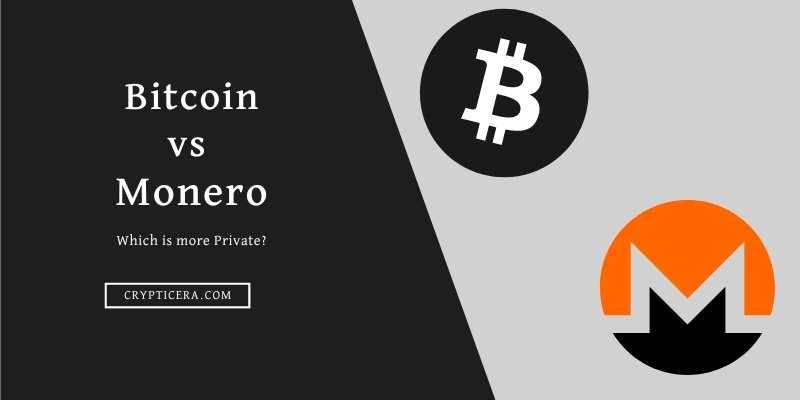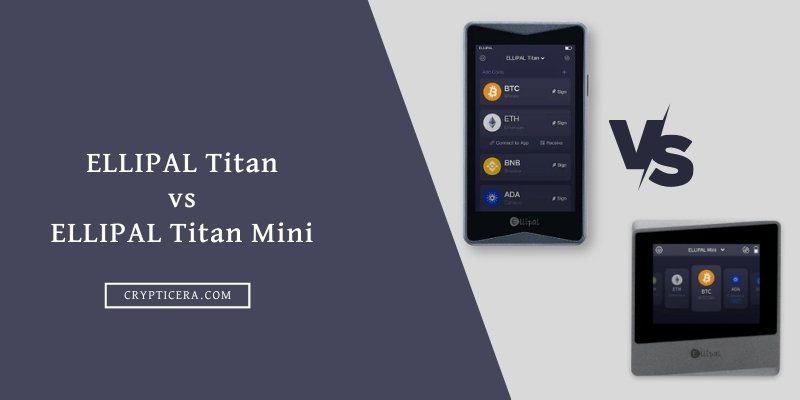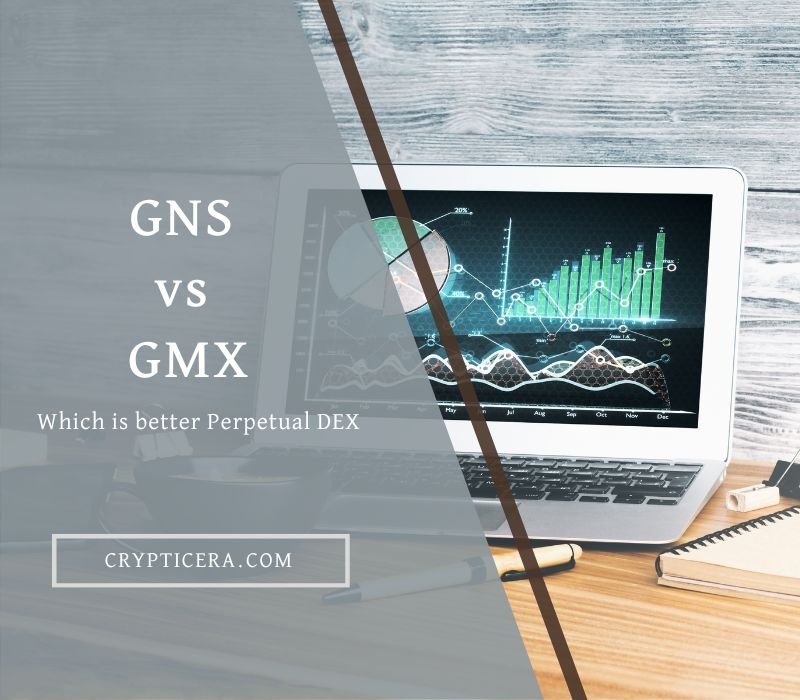Cryptocurrencies have gained significant attention in recent years, with Bitcoin and Monero being two of the most popular digital currencies.
Both are decentralized digital currencies that operate on a peer-to-peer network, but they differ in various aspects, including their privacy features, transaction speed, security, and community adoption.
Bitcoin, introduced in 2009, was the first cryptocurrency and has gained widespread popularity as a digital asset and investment. Monero, introduced in 2014, is a newer cryptocurrency that focuses on privacy and anonymity.
In this article, we will compare “Bitcoin vs Monero” in detail to understand the differences between the two cryptocurrencies.
Bitcoin vs Monero: Key Differences
| Key Points | Bitcoin | Monero |
|---|---|---|
| Privacy | Pseudonymous | Private |
| Fungibility | Less fungible | More fungible |
| Transaction Speed | 7 – 10 TPS | 1500 TPS |
| Scalability | 2 min block time | 10 min block time |
| Block Size | 1 MB | Not limited |
| Mining Algorithm | PoW (SHA-256) | PoW (RandomX) |
| Market Cap | $580 billion | $1.2 billion |
| ROI Since creation | 1500% + | 20,0000% + |
| Supply Cap | 21 million BTC | Infinite supply |
| Community & Adoption | Widespread adoption | Smaller community |
| Use Cases | Digital store of value | Privacy-focused transactions |
Bitcoin Overview

Bitcoin is the first and most well-known cryptocurrency, often referred to as digital gold. It operates on a decentralized network, using blockchain technology to record transactions.
Bitcoin transactions are verified by network nodes through cryptography and are added to the blockchain, a public ledger that is transparent and immutable.
It has a finite supply, with a maximum cap of 21 million BTC that can ever be mined.
Read More: Bitcoin and its Working: The Beginner’s Guide
Monero Overview

Monero, on the other hand, is a privacy-centric cryptocurrency that focuses on providing anonymity to its users. Monero uses ring signatures and stealth addresses to obfuscate transaction details and ensure privacy.
Ring signatures mix the sender’s address with other random addresses, making it difficult to trace the transaction back to the original sender.
Stealth addresses generate a unique one-time address for each transaction, making it impossible to link transactions to a specific recipient.
Read: Monero Vs ZCash: Which Blockchain Offers More Privacy?
Comparison between Bitcoin and Monero
Privacy and Anonymity
Privacy is a crucial aspect of cryptocurrencies, and Bitcoin and Monero have different approaches to privacy. While Bitcoin transactions are transparent and recorded on a public ledger, Monero transactions are private and untraceable.
Monero’s ring signatures and stealth addresses make it difficult to trace transactions, ensuring a higher level of privacy and anonymity compared to Bitcoin.
Winner: Monero (XMR) is more private and Anonymous than Bitcoin (BTC).
TPS and Block Time
Monero’s TPS can vary based on network conditions, but typically it can process around 1000 to 1500 transactions per second (TPS).
Bitcoin’s TPS is around 3 to 7 transactions per second (TPS), but it can also vary based on network congestion.
Monero has a target block time of 2 minutes, whereas Bitcoin’s block time is 10 minutes. This means that a new block is added to the blockchain every 2 or 10 minutes on average.
Winner: Moner (XMR) offers faster confirmation times and block creation than Bitcoin [BTC].
Block Size
Bitcoin has a fixed block size limit of 1 MB, which has been a point of contention in the community. Some argue that increasing the block size limit would improve scalability, while others believe it would compromise decentralization.
Monero, on the other hand, does not have a fixed block size limit. Instead, it uses a dynamic block size that adjusts based on transaction volumes, allowing for more transactions to be processed during periods of high demand.
Related: Bitcoin vs Bitcoin Cash
Fees
Bitcoin transaction fees can be high during periods of high demand, as users compete to have their transactions included in a limited block space.
This has led to debates on the optimal fee structure and its impact on transaction costs. BTC fees are around $0.4 – $3.5.
Monero transaction fees are generally lower compared to Bitcoin, due to its dynamic block size and faster transaction confirmation times.
This makes Monero more cost-effective for smaller transactions, which can be an advantage in certain use cases.
Winner: Monero transactions are more affordable than Bitcoin [BTC].
Consensus Mechanism and Mining Algorithm
Monero uses a consensus mechanism called Proof-of-Work (PoW), which involves miners competing to solve complex mathematical equations to add new blocks to the blockchain.
However, unlike Bitcoin, Monero uses a modified version of PoW called CryptoNight, which is designed to be resistant to ASIC mining and promote more decentralized mining.
Bitcoin uses the SHA-256 hashing algorithm for its PoW, which can be mined using specialized ASIC hardware.
Related: Best Crypto Mining Software for Windows
Use Cases
Bitcoin (BTC) is primarily used as a digital store of value and a form of investment. It has gained popularity as a hedge against inflation and a diversification asset in investment portfolios.
Bitcoin is also used for cross-border remittances, providing a faster and cheaper alternative to traditional remittance methods.
Monero, with its focus on privacy and anonymity, is primarily used for transactions that require enhanced privacy.
It is often used for peer-to-peer transactions, online purchases, and donations, where users value their privacy and do not want transaction details to be publicly visible.
BTC vs XMR: Adoption and Market Cap
Bitcoin is the most widely adopted and recognized cryptocurrency, with a large and active community of users, developers, and businesses.
It is accepted as a payment method by an increasing number of merchants and service providers worldwide, including major companies such as Microsoft, AT&T, and PayPal.
The market capitalization of Bitcoin is around $590 billion USD, making it the largest cryptocurrency by mCap.
While Monero is not as widely adopted as Bitcoin. The market capitalization of Monero is around $1.8 billion USD, which is significantly smaller than Bitcoin.
How Monero Acheives Privacy and Anonymity?
Ring Signature: Monero uses ring signatures to obfuscate the origin of a transaction. In a ring signature, the transaction inputs are mixed with a group of decoy inputs, making it difficult to determine which input is the actual source of the transaction. This helps in hiding the sender’s identity.
Stealth Addresses: It also uses stealth addresses to protect the receiver’s identity. When a sender initiates a transaction, a one-time random address, known as a stealth address, is generated for the receiver.
This stealth address is linked to the receiver’s actual address through a cryptographic process, making it impossible to link the transaction to the receiver’s real address.
Ring Confidential Transactions (RingCT): Monero combines ring signatures with confidential transactions through a mechanism called Ring Confidential Transactions (RingCT).
RingCT allows for both the transaction amount and the sender’s identity to be hidden, providing a high level of privacy and anonymity.
Why Monero is More Scalable than Bitcoin?
Monero has a dynamic block size, which means that the size of each block can vary based on the number of transactions in the network.
This allows Monero to adjust its block size dynamically, making it more adaptable to changes in transaction volume compared to Bitcoin, which has a fixed block size of 1MB.
Monero has a faster block generation time compared to Bitcoin. Monero’s block time is around 2 minutes, whereas Bitcoin’s block time is around 10 minutes.
This means that Monero can process transactions more quickly, leading to shorter confirmation times and higher transaction throughput.
Monero, Hackers, and Illegal Activities
There have been instances where XMR has been associated with illegal activities, including by hackers.
- Monero has been reportedly used as the preferred form of ransom payment in various ransomware attacks. Hackers encrypt victims’ data and demand a ransom in Monero in exchange for the decryption key. The privacy features of Monero make it difficult to trace the transactions, which can potentially benefit hackers seeking to remain anonymous.
- It has also been used in transactions on the dark web, a part of the internet that is not indexed by search engines and is often associated with illegal activities such as drug trafficking, counterfeit goods, and other illegal transactions.
- There have been instances where hackers have infected computers with malware that mines Monero without the owner’s consent, also known as cryptojacking.
Related: Best Crypto Security Measures
Final Thoughts: Which is better?
You might have many questions. Which Should you choose, Bitcoin or monero? which is the better investment, Bitcoin vs Monero?
While Bitcoin is known for its decentralization, widespread adoption, and focus on the store of value, Monero stands out with its emphasis on privacy, anonymity, and community-driven development.
Both cryptocurrencies have their strengths and weaknesses, and their adoption and popularity depend on various factors, including user preferences, use cases, market demand, and regulatory environment.
FAQs
- Is Monero more private than Bitcoin?
Yes, Monero is designed to be more private and anonymous compared to Bitcoin. While Bitcoin transactions are recorded on a public blockchain, Monero transactions are obfuscated, making it difficult to trace transaction details.
- Can I use Monero for everyday transactions?
Yes, Monero can be used for everyday transactions where privacy is a priority. It is accepted by a growing number of online merchants, and there are Monero wallets available for mobile devices for easy everyday use.
- Does Bitcoin or Monero have lower transaction fees?
Monero generally has lower transaction fees compared to Bitcoin due to its dynamic block size and faster transaction confirmation times. However, transaction fees for both cryptocurrencies can vary depending on network demand and other factors.


